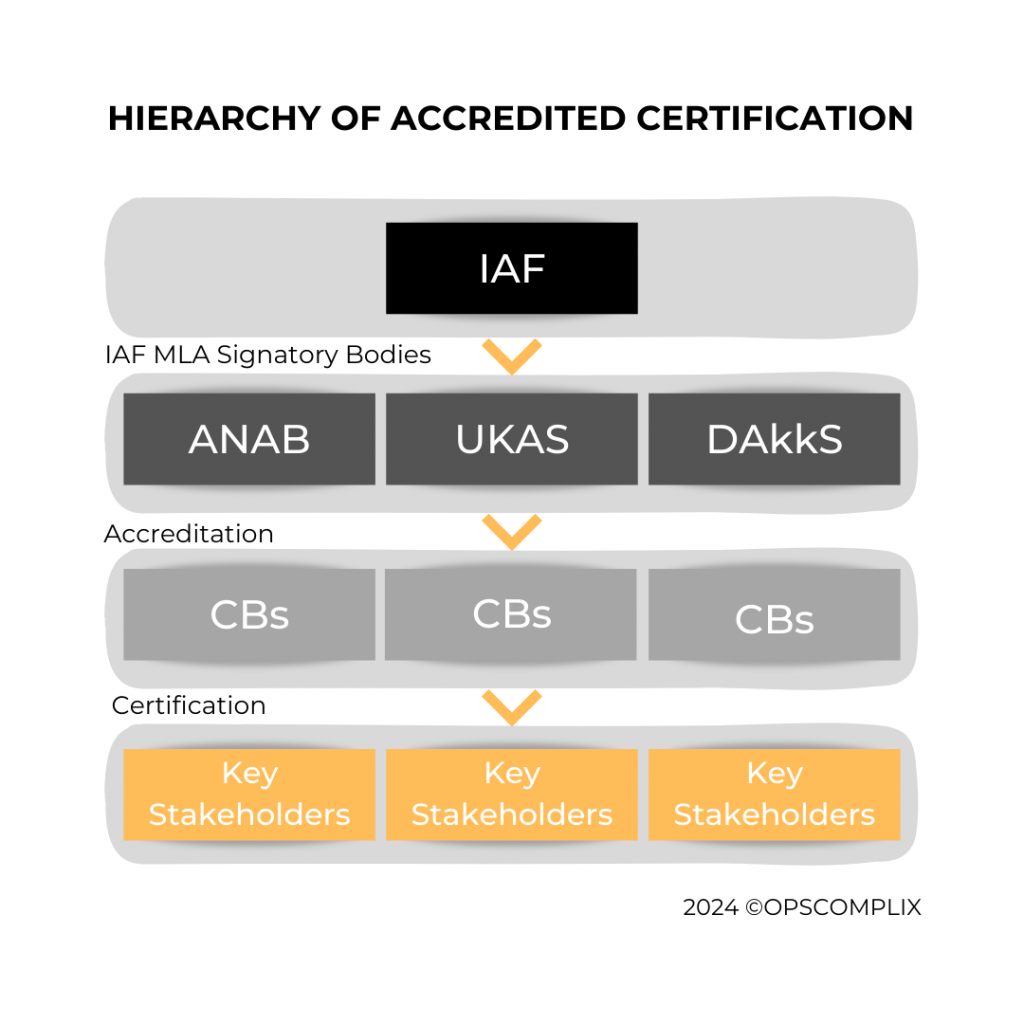In the dynamic landscape of industries and markets, the pursuit of excellence and adherence to international standards have become paramount for businesses worldwide. Whether you’re a certification body seeking accreditation or an organization seeking certification, one fundamental question emerges: How do you ensure that the accreditation or certification process maintains the highest standards of professionalism and credibility?
At the core of this question lies the significance of accreditation and certification within the context of international standards, such as those established by the International Organization for Standardization (ISO), and the pivotal role of each entity within the ISO industry hierarchy for businesses, consumers, clients, investors, professionals, regulatory authorities, and society.
International Accreditation Forum (IAF)
At the climax of the accreditation hierarchy lies the International Accreditation Forum (IAF), serving as the global association of Conformity Assessment Accreditation Bodies. The primary purpose of IAF is to ensure that its authorized Accreditation Bodies (ABs) only accredit Certification Bodies (CBs) that are competent to issue certification, and the secondary purpose is to establish Multilateral Recognition Arrangements (MLAs) between its Accreditation Bodies (ABs).
Key Benefits of IAF Authorization:
1. Confidence Building: It instills confidence in businesses procuring services and products by ensuring consistent quality and compliance.
2. Demonstration of Compliance: It represents a tangible demonstration of compliance with agreed standards through the IAF MLA.
3. Market Expansion: It contributes to removing barriers, expanding the market, and generating economic benefits for businesses and industries.

Accreditation Bodies (ABs)
Accreditation Bodies (ABs) are organizations authorized by IAF to accredit Certification Bodies (CBs). Examples of ABs include ANAB (United States), IAS (United States), UKAS (United Kingdom), DAkkS (Germany), JASANZ (Australia and New Zealand), and others. As of now, IAF oversees a network of 74 ABs that have accredited 1478 CBs worldwide.
What Is Accreditation?
Based on ISO/IEC 17000, accreditation is a third-party attestation related to products, processes, systems, or persons. ABs perform accreditation of CBs against internationally agreed-upon standards such as ISO/IEC 17021 (management systems), ISO/IEC 17065 (products), ISO/IEC 17065 (services), ISO/IEC 17024 (personnel), and so on. Examples of CBs include CISCO, CompTIA, EC-Council, ISACA, (ISC)², GIC, DEKRA, and so on.
Certification Bodies (CBs)
Certification Bodies (CBs) are organizations accredited by IAF-recognized ABs to provide certification services in the fields of management systems, products, services, and personnel based on specific conformity assessment standards (e.g., ISO/IEC 17021 for management system certification, ISO/IEC 17024 for personnel certification).
What Is Certification?
Certification is a third-party attestation that an organization conforms to the requirements specified in a particular ISO standard. CBs perform certification of management systems, products, services, and personnel in various industries. For example, an IT company desires ISO/IEC 27001 certification to demonstrate its commitment to safeguarding information to its key stakeholders (e.g., partners, investors, regulatory authorities). The company selects a credible CB accredited by an IAF-recognized AB to assess its ISMS against the requirements of ISO/IEC 27001. If the company’s ISMS meets the requirements of the standard, the company obtains ISO/IEC 27001 certification affirming its adherence to internationally recognized best practices in information security management.
International Organization for Standardization (ISO)
International Organization for Standardization (ISO) is an independent, non-governmental international organization that develops and publishes international standards. ISO was founded in 1947 and has a membership of 170 national standards bodies, and 828 technical committees and subcommittees. As of now, ISO has published 25,204 International Standards that are developed through a consensus-based process involving experts from relevant industries, governments, non-governmental organizations, and other stakeholders.
An International Standard is a document that provides practical information and best practices in a specific sector or industry. There are four types of ISO standards, including conformity assessment standards, management system standards, guideline standards, and terminology and documentation standards.
1. Conformity Assessment Standards: provide requirements related to conformity assessment processes applicable to products, services, processes, systems, organizations, or individuals for certification, testing, and inspection purposes (e.g., ISO/IEC 17021-1 for audit and certification of management systems, ISO/IEC 17024 for certification of individuals).
2. Management System Standards: outline requirements for establishing, implementing, maintaining, and improving a management system (e.g., ISO/IEC 27001 for information security, ISO 9001 for quality management).
3. Guideline Standards: offer recommendations and best practices to complement management system standards or achieve specific objectives without the rigorous requirements of management system standards (e.g., ISO/IEC 27005 for information security risk management, ISO 19001 for management system auditing).
4. Terminology and Documentation Standards: establish common terminology, definitions, and guidelines for documentation across various fields or industries (e.g., ISO/IEC 27000 for information security vocabulary, ISO 9000 for quality management vocabulary).
In conclusion, accreditation and certification are indispensable tools in today’s business landscape, ensuring quality, reliability, and integrity. Accreditation validates the competence and impartiality of certification bodies, instilling confidence in stakeholders and facilitating international trade. Meanwhile, certification verifies organizations’ compliance with ISO standards, enhancing their reputation, access to markets, and operational efficiency. Together, accreditation and certification signify a commitment to excellence and continuous improvement, driving competitiveness and contributing to societal well-being in the global marketplace.
OPSCOMPLIX provides guided implementation, document development, internal auditing, and other supporting activities for accreditation and certification. For more information, please reach out to us here.